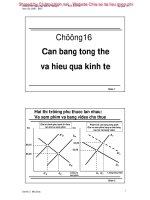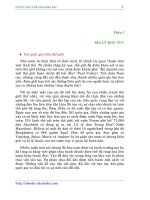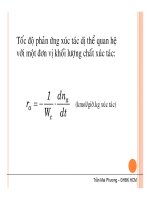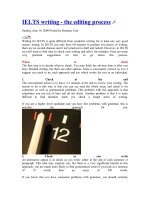The refugees
Bạn đang xem bản rút gọn của tài liệu. Xem và tải ngay bản đầy đủ của tài liệu tại đây (1.27 MB, 102 trang )
Tai Lieu Chat Luong
AlsobyVietThanhNguyen
Fiction
TheSympathizer
Nonfiction
NothingEverDies:
VietnamandtheMemoryofWar
RaceandResistance:
LiteratureandPoliticsinAsianAmerica
TranspacificStudies:
FraminganEmergingField(coeditedwithJanetHoskins)
GrovePress
NewYork
Copyright©2017byVietThanhNguyen
Versionsofthestoriescollectedherewereoriginallypublishedinthefollowingpublications:“Black-EyedWomen,”inEpoch,64.2;“TheOther
Man”(publishedas“ACorrectLife”),inBestNewAmericanVoices2007;“WarYears,”(publishedas“TheWarYears”)inTriQuarterly,
135/136;“TheTransplant”(publishedas“ArthurArellano”),inNarrative,Spring2010;“I’dLoveYoutoWantMe”(publishedas“TheOther
Woman”),inGulfCoast,20.1;“TheAmericans,”intheChicagoTribune,December2010;“SomeoneElseBesidesYou,”inNarrative,
Winter2008;“Fatherland,”inNarrative,Spring2011.
Allrightsreserved.Nopartofthisbookmaybereproducedinanyformorbyanyelectronicormechanicalmeans,includinginformation
storageandretrievalsystems,withoutpermissioninwritingfromthepublisher,exceptbyareviewer,whomayquotebriefpassagesina
review.Scanning,uploading,andelectronicdistributionofthisbookorthefacilitationofsuchwithoutthepermissionofthepublisheris
prohibited.Pleasepurchaseonlyauthorizedelectroniceditions,anddonotparticipateinorencourageelectronicpiracyofcopyrighted
materials.Yoursupportoftheauthor’srightsisappreciated.Anymemberofeducationalinstitutionswishingtophotocopypartorallofthe
workforclassroomuse,oranthology,shouldsendinquiriestoGroveAtlantic,154West14thStreet,NewYork,NY10011or
FirstGroveAtlantichardcoveredition:February2017
PublishedsimultaneouslyinCanada
PrintedintheUnitedStatesofAmerica
ISBN978-0-8021-2639-9
eISBN978-0-8021-8935-6
LibraryofCongressCataloging-in-Publicationdataisavailableforthistitle.
GrovePress
animprintofGroveAtlantic
154West14thStreet
NewYork,NY10011
DistributedbyPublishersGroupWest
groveatlantic.com
Forallrefugees,everywhere
Contents
Black-EyedWomen
TheOtherMan
WarYears
TheTransplant
I’dLoveYoutoWantMe
TheAmericans
SomeoneElseBesidesYou
Fatherland
Acknowledgments
Iwrotethisbookfortheghosts,who,becausethey’reoutsideoftime,aretheonlyoneswithtime.
RobertoBolaño,Antwerp
Itisnotyourmemorieswhichhauntyou.
Itisnotwhatyouhavewrittendown.
Itiswhatyouhaveforgotten,whatyoumustforget.
Whatyoumustgoonforgettingallyourlife.
JamesFenton,“AGermanRequiem”
ame would strike someone, usually the kind that healthy-minded people would not wish upon
themselves,suchasbeingkidnappedandkeptprisonerforyears,sufferinghumiliationinasexscandal,or
surviving something typically fatal. These survivors needed someone to help write their memoirs, and
their agents might eventually come across me. “At least your name’s not on anything,” my mother once
said.WhenImentionedthatIwouldnotmindbeingthankedintheacknowledgments,shesaid,“Letme
tellyouastory.”ItwouldbethefirsttimeIheardthisstory,butnotthelast.“Inourhomeland,”shewent
on,“therewasareporterwhosaidthegovernmenttorturedthepeopleinprison.Sothegovernmentdoes
tohimexactlywhathesaidtheydidtoothers.Theysendhimawayandnooneeverseeshimagain.That’s
whathappenstowriterswhoputtheirnamesonthings.”
BythetimeVictorDevotochoseme,Ihadresignedmyselftobeingoneofthosewriterswhosenames
did not appear on book covers. His agent had given him a book that I had ghostwritten, its ostensible
author the father of a boy who had shot and killed several people at his school. “I identify with the
father’sguilt,”Victorsaidtome.Hewasthesolesurvivorofanairplanecrash,onehundredandseventythreeothershavingperished,includinghiswifeandchildren.Whatwasleftofhimappearedonallthe
talk shows, his body there but not much else. The voice was a soft monotone, and the eyes, on the
occasions when they looked up, seemed to hold within them the silhouettes of mournful people. His
publishersaidthatitwasurgentthathefinishhisstorywhileaudiencesstillrememberedthetragedy,and
thiswasmypreoccupationonthedaymydeadbrotherreturnedtome.
Mymotherwokemewhileitwasstilldarkoutsideandsaid,“Don’tbeafraid.”
Throughmyopendoor,thelightfromthehallwaystung.“WhywouldIbeafraid?”
Whenshesaidmybrother’sname,Ididnotthinkofmybrother.Hehaddiedlongago.Iclosedmy
eyes and said I did not know anyone by that name, but she persisted. “He’s here to see us,” she said,
stripping off my covers and tugging at me until I rose, eyes half-shut. She was sixty-three, moderately
forgetful,andwhensheledmetothelivingroomandcriedout,Iwasnotsurprised.“Hewasrighthere,”
shesaid,kneelingbyherfloralarmchairasshefeltthecarpet.“It’swet.”Shecrawledtothefrontdoorin
hercottonpajamas,followingthetrail.WhenItouchedthecarpet,itwasdamp.ForamomentItwitched
in belief, and the silence of the house at four in the morning felt ominous. Then I noticed the sound of
rainwater in the gutters, and the fear that had gripped my neck relaxed its hold. My mother must have
openedthedoor,gottendrenched,thencomebackinside.Ikneltbyherasshecrouchednexttothedoor,
herhandontheknob,andsaid,“You’reimaginingthings.”
“I know what I saw.” Brushing my hand off her shoulder, she stood up, anger illuminating her dark
eyes.“Hewalked.Hetalked.Hewantedtoseeyou.”
“Thenwhereishe,Ma?Idon’tseeanyone.”
“Ofcourseyoudon’t.”Shesighed,asifIweretheoneunabletograsptheobvious.“He’saghost,isn’t
he?”
Eversincemyfatherdiedafewyearsago,mymotherandIlivedtogetherpolitely.Wesharedapassion
forwords,butIpreferredthesilenceofwritingwhileshelovedtotalk.Sheconstantlyfedmegossipand
stories,theonlykindIenjoyedconcerningmyfatherbackwhenhewasamanIdidnotknow,youngand
happy.Thencamestoriesofterrorliketheoneaboutthereporter,themoralbeingthatlife,likethepolice,
enjoysbeatingpeoplenowandagain.Finallytherewasherfavoritekind,theghoststory,ofwhichshe
knewmany,somefirsthand.
“Aunt Six died of a heart attack at seventy-six,” she told me once, twice, or perhaps three times,
repetitionbeingherhabit.Inevertookherstoriesseriously.“ShelivedinVungTauandwewereinNha
Trang.IwasbringingdinnertothetablewhenIsawAuntSixsittingthereinhernightgown.Herlonggray
hair,whichsheusuallyworeinachignon,waslooseandfelloverhershouldersandinherface.Ialmost
droppedthedishes.WhenIaskedherwhatshewasdoinghere,shejustsmiled.Shestoodup,kissedme,
andturnedmetowardthekitchen.WhenIturnedaroundagaintoseeher,shewasgone.Itwasherghost.
UncleconfirmeditwhenIcalled.Shehadpassedawaythatmorning,inherownbed.”
AuntSixdiedagooddeath,accordingtomymother,athomeandwithfamily,herghostsimplymaking
the rounds to say farewell. My mother repeated her aunt’s story while we sat at the kitchen table the
morningsheclaimedtohaveseenmybrother,herson.Ihadbrewedherapotofgreenteaandtakenher
temperaturedespiteherprotests,theresultbeing,asshehadpredicted,normal.Wavingthethermometer
atme,shesaidhemusthavedisappearedbecausehewastired.Afterall,hehadjustcompletedajourney
ofthousandsofmilesacrossthePacific.
“Sohowdidhegethere?”
“Heswam.”Shegavemeapityinglook.“That’swhyhewaswet.”
“Hewasanexcellentswimmer,”Isaid,humoringher.“Whatdidhelooklike?”
“Exactlythesame.”
“It’sbeentwenty-fiveyears.Hehasn’tchangedatall?”
“Theyalwayslookexactlythesameaswhenyoulastsawthem.”
Irememberedhowhelookedthelasttime,andanyhumorthatIfeltvanished.Thestunnedlookonhis
face,theopeneyesthatdidnotflinchevenwiththesplinteredboardoftheboat’sdeckpressingagainst
hischeek—Ididnotwanttoseehimagain,assumingtherewassomethingorsomeonetosee.Aftermy
mother left for her shift at the salon, I tried to go back to sleep but could not. His eyes stared at me
wheneverIclosedmyown.OnlynowwasIconsciousofnothavingrememberedhimformonths.Ihad
longstruggledtoforgethim,butjustbyturningacornerintheworldorinmymindIcouldrunintohim,
my best friend. From as far back as I can recall, I could hear his voice outside our house, calling my
name. That was my signal to follow him down our village’s lanes and pathways, through jackfruit and
mangogrovestothedikesandfields,dodgingshatteredpalmtreesandbombcraters.Atthetime,thiswas
anormalchildhood.
Lookingback,however,Icouldseethatwehadpassedouryouthinahauntedcountry.Ourfatherhad
beendrafted,andwefearedthathewouldneverreturn.Beforeheleft,hehaddugabombshelternextto
our home, a sandbagged bunker whose roof was braced by timber. Even though it was hot and airless,
dankwiththeodoroftheearthandalivewiththemovementofworms,weoftenwenttheretoplayas
littlechildren.Whenwewereolder,wewenttostudyandtellstories.Iwasthebeststudentinmyschool,
excellentenoughformyteachertoteachmeEnglishafterhours,lessonsIsharedwithmybrother.He,in
turn,toldmetalltales,folklore,andrumors.Whenairplanesshriekedoverheadandwehuddledwithmy
motherinthebunker,hewhisperedghoststoriesintomyeartodistractme.Except,heinsisted,theywere
not ghost stories. They were historical accounts from reliable sources, the ancient crones who chewed
betel nut and spat its red juice while squatting on their haunches in the market, tending coal stoves or
overseeing baskets of wares. Our land’s confirmed residents, they said, included the upper half of a
Korean lieutenant, launched by a mine into the branches of a rubber tree; a scalped black American
floatinginthecreeknotfarfromhisdownedhelicopter,hiseyesandtheexposedhalf-moonofhisbrain
glisteningabovethewater;andadecapitatedJapaneseprivategropingthroughcassavashrubberyforhis
head. These invaders came to conquer our land and now would never go home, the old ladies said,
cackling and exposing lacquered teeth, or so my brother told me. I shivered with delight in the gloom,
hearingthoseblack-eyedwomenwithmyownears,anditseemedtomethatIwouldnevertellstories
likethose.
Wasitironic,then,thatImadealivingfrombeingaghostwriter?IposedthequestiontomyselfasIlayin
bedinthemiddleoftheday,butthewomenwiththeirblackeyesandblackteethheardme.Youcallwhat
youhavealife?Theirteethclackedastheylaughedatme.Ipulledthecoversuptomynose,thewayI
usedtodoinmyearlyyearsinAmerica,whencreaturesnotonlylurkedinthehallwaybutalsoroamed
outside. My mother and father always peeked through the living room curtains before answering any
knock,afraidofouryoungcountrymen,boyswhohadlearnedaboutviolencefromgrowingupinwartime.
“Don’topenthedoorforsomeoneyoudon’tknow,”mymotherwarnedme,once,twice,threetimes.“We
don’twanttoenduplikethatfamilytieddownatgunpoint.Theyburnedthebabywithcigarettesuntilthe
mothershowedthemwhereshehidhermoney.”MyAmericanadolescencewasfilledwithtalesofwoe
like this, all of them proof of what my mother said, that we did not belong here. In a country where
possessionscountedforeverything,wehadnobelongingsexceptourstories.
When knocking woke me, it was dark outside. My watch said 6:35 in the evening. The knock came
again,gentle,tentative.Despitemyself,Iknewwhoitwas.Ihadlockedthebedroomdoorjustincase,
andnowIpulledthecoversovermyhead,myheartbeatingfast.Iwilledhimtogoaway,butwhenhe
started rattling the doorknob, I knew I had no choice but to rise. The fine hairs of my body stood at
attentionwithmeasIwatchedthedoorknobtremblewiththepressureofhisgrip.Iremindedmyselfthat
hehadgivenuphislifeforme.TheleastIcoulddowasopenthedoor.
Hewasbloatedandpale,hairfeathery,skindark,cladinblackshortsandaraggedgrayT-shirt,arms
andlegsbony.ThelasttimeIhadseenhim,hewastallerbyahead;nowoursituationswerereversed.
When he said my name, his voice was hoarse and raspy, not at all like his adolescent alto. His eyes,
though, were the same, curious, as were his lips, slightly parted, always prepared to speak. A purple
bruisewithundertonesofblackgleamedonhislefttemple,butthebloodIrememberedwasgone,washed
away,Isuppose,bysaltwaterandstorms.Eventhoughitwasnotraining,hewaswater-soaked.Icould
smelltheseaonhim,andworse,Icouldsmelltheboat,rancidwithhumansweatandexcreta.
Whenhesaidmyname,Itrembled,butthiswasaghostofsomeonewhomIlovedandwouldnever
harm,thekindofghostwho,mymotherhadsaid,wouldnotharmme.“Comein,”Isaid,whichseemedto
methebravestthingIcouldsay.Unmoved,helookedatthecarpetonwhichhewasdrippingwater.When
I brought him a clean T-shirt and shorts, along with a towel, he looked at me expectantly until I turned
around and let him change. The clothes were my smallest but still a size too large for him, the shorts
extendingtohisknees,theT-shirtvoluminous.Imotionedhimin,andthistimeheobeyed,sittingonmy
rumpledbed.Herefusedtomeetmygaze,seeminglymorefearfulofmethanIwasofhim.Whilehewas
stillfifteenIwasthirty-eight,nolongeranexuberanttomboy,reluctanttotalkunlessIhadapurpose,as
wasthecasewhenIinterviewedVictor.Beinganauthor,evenoneofthethirdorfourthrank,involvedan
etiquetteIcouldliveupto.Butwhatdoesonesaytoaghost,excepttoaskwhyhewashere?Iwasafraid
oftheanswer,soinsteadIsaid,“Whattookyousolong?”
Helookedatmybaretoeswiththeirbarenails.PerhapshesensedthatIwasnotgoodwithchildren.
Motherhoodwastoointimateforme,aswererelationshipslastingmorethanonenight.
“Youhadtoswim.Ittakesalongtimetogosofar,doesn’tit?”
“Yes.”Hismouthremainedopen,asifhewantedtosaymorebutwasuncertainofwhattosayorhow
tosayit.Perhapsthisapparitionwasthefirstconsequenceofwhatmymotherconsideredmyunnatural
nature,childlessandsingle.Perhapshewasnotafigmentofmyimaginationbutasymptomofsomething
wrong, like the cancer that killed my father. His was also a good death, according to my mother,
surroundedbyfamilyathome,notlikewhathappenedtohersonand,nearly,tome.Panicsurgedfrom
thatbottomlesswellwithinmyselfthatIhadsealedwithconcrete,andIwasrelievedtohearthefront
dooropening.“Motherwillwanttoseeyou,”Isaid.“Waithere.I’llberightback.”
Whenwereturned,wefoundonlyhiswetclothesandthewettowel.SheheldupthegrayT-shirt,the
sameashehadwornontheblueboatwiththeredeyes.
“Nowyouknow,”mymothersaid.“Neverturnyourbackonaghost.”
TheblackshortsandgrayT-shirtstankofbrineandwereheavywithmorethanjustwater.WhenIcarried
themtothekitchen,theweightoftheclothesinmyhandswastheweightofevidence.Ihadseenhimwear
theseclothesondozensofoccasions.Irememberedthemwhentheshortswerenotblackwithgrimebut
stillpristineblue,whentheshirtwasnotgrayandraggedbutwhiteandneat.“Doyoubelievenow?”my
mother said, lifting the lid of the washing machine. I hesitated. Some people say that faith burns inside
them,butmynewfoundfaithwaschillingtome.“Yes,”Isaid.“Ibelieve.”
Themachinehummedinthebackgroundaswesatfordinneratthekitchentable,theairanointedwith
staraniseandginger.“That’showcomeittookhimsomanyyears,”mymothersaid,blowingontoherhot
soup.Nothinghadeverdauntedherappetiteordentedhercast-ironstomach,noteventheeventsonthe
boatortheapparitionofherson.“Heswamtheentiredistance.”
“AuntSixlivedhundredsofmilesawayandyousawherthesameday.”
“Ghosts don’t live by our rules. Each ghost is different. Good ghosts, bad ghosts, happy ghosts, sad
ghosts.Ghostsofpeoplewhodiewhenthey’reold,whenthey’reyoung,whenthey’resmall.Youthink
babyghostsbehavethesameasgrandfatherghosts?”
Iknewnothingaboutghosts.IhadnotbelievedinghostsandneitherdidanyoneelseIknewexceptfor
my mother and Victor, who himself seemed spectral, the heat of grief rendering him pale and nearly
translucent, his only color coming from a burst of uncombed red hair. Even with him the otherworldly
cameuponlytwice,onceonthephoneandonceinhislivingroom.Nothinghadbeentouchedsincethe
dayhisfamilyleftfortheairport,noteventhesorrowfuldust.Ihadtheimpressionthatthewindowshad
notbeenopenedsincethatday,asifhewantedtopreservethedepletedairthathiswifeandchildrenhad
breathedbeforetheysufferedtheirbaddeaths,sofarfromhome.“Thedeadmoveon,”hehadsaid,coiled
inhisarmchair,handsbetweenhisthighs.“Buttheliving,wejuststayhere.”
These words opened his last chapter, the one I worked on after my mother went to sleep and I
descendedintothebrightbasement,illuminatedwithfluorescenttubes.Iwroteonesentence,thenpaused
tolistenforaknockorstepsonthestairway.Myrhythmthroughthenightwasestablished,afewlines
followed by a wait for something that did not come, the next day more of the same. The conclusion of
Victor’smemoirwasinsightwhenmymothercamehomefromthenailsalonwithshoppingbagsfrom
Chinatown,onefullofgroceries,theotherwithunderwear,apairofpajamas,bluejeans,adenimjacket,
apackofsocks,knitgloves,abaseballcap.AfterstackingthemnexttohisdriedandironedT-shirtand
shorts,shesaid,“Hecan’tbewanderingoutinthecoldwithwhatyougavehim,likeahomelessperson
orsomeillegalimmigrant.”WhenIsaidthatIhadn’tthoughtofitthatway,shesnorted,annoyedbymy
ignorance of the needs of ghosts. Only after dinner did she warm up again. Her mood had improved
becauseinsteadofretreatingtomybasementasusual,Ihadstayedtowatchoneofthesoapoperasshe
rentedbythearmfuls,serialsofbeautifulKoreanpeoplesnaredinromantictangles.“Ifwehadn’thada
war,” she said that night, her wistfulness drawing me closer, “we’d be like the Koreans now. Saigon
wouldbeSeoul,yourfatheralive,youmarriedwithchildren,mearetiredhousewife,notamanicurist.”
Her hair was in curlers, and a bowl of watermelon seeds was in her lap. “I’d spend my days visiting
friendsandbeingvisited,andwhenIdied,ahundredpeoplewouldcometomyfuneral.I’dbeluckyif
twentypeoplewillcomehere,withyoutakingcareofthings.Thatfrightensmemorethananything.You
can’t even remember to take out the garbage or pay the bills. You won’t even go outside to shop for
groceries.”
“I’dremembertotakecareofyoursoul.”
“When would you hold the wake? When would the celebration of my death anniversary be? What
wouldyousay?”
“Writeitdownforme,”Isaid.“WhatI’msupposedtosay.”
“Yourbrotherwouldhaveknownwhattodo,”shesaid.“That’swhatsonsarefor.”
TothisIhadnoreply.
When he had still not appeared by eleven, my mother went to sleep. I descended to my basement once
moreandtriedtowrite.Writingwasenteringintofog,feelingmywayforaroutefromthisworldtothe
unearthlyworldofwords,arouteeasiertofindonsomedaysthanothers.LurkingonmyshoulderasI
stumbled through the grayness was the parrot of a question, asking me how I lived and he died. I was
youngerandweaker,yetitwasmybrotherweburied,lettinghimslipintotheoceanwithoutashroudora
wordfromme.Thewailingofmymotherandthesobbingofmyfatherroseinmymemory,butneither
drowned out my own silence. Now it was right to say a few words, to call him back as he must have
wanted,butIcouldnotfindthem.JustwhenIthoughtanothernightwouldpasswithouthisreturn,Iheard
theknockatthetopofthestairs.Ibelieve,Iremindedmyself.Ibelievethathewouldneverharmme.
“Don’tknock,”IsaidwhenIopenedthedoor.“It’syourhome,too.”
Hemerelystaredatme,andwelapsedintoanawkwardsilence.Thenhesaid,“Thankyou.”Hisvoice
wasstrongernow,almostashigh-pitchedasIremembered,andthistimehedidnotlookaway.Hestill
wore my T-shirt and shorts, but when I showed him the clothes that my mother had bought, he said, “I
don’tneedthose.”
“You’rewearingwhatIgaveyou.”
HissilencewentonforsolongIthoughthemightnothaveheardme.
“Wewearthemfortheliving,”hesaidatlast.“Notforus.”
Iledhimtothecouch.“Youmeanghosts?”
Hesatdownnexttome,consideringmyquestionbeforeanswering.
“Wealwaysknewghostsexisted,”hesaid.
“Ihadmydoubts.”Iheldhishand.“Whyhaveyoucomeback?”
Hisgazewasdiscomforting.Hehadnotblinkedonce.
“Ihaven’tcomeback,”hesaid.“I’vecomehere.”
“Youhaven’tleftthisworldyet?”
Henodded.
“Whynot?”
Againhewassilent.Finallyhesaid,“Whydoyouthink?”
Ilookedaway.“I’vetriedtoforget.”
“Butyouhaven’t.”
“Ican’t.”
Ihadnotforgottenournamelessblueboatandithadnotforgottenme,theredeyespaintedoneither
sideofitsprowhavingneverceasedtostaremedown.Afterfouruneventfuldaysonacalmseaunder
blueskiesandclearnights,islandsatlastcameintoview,blackstitchingonthefarawayhorizon.Itwas
thenthatanothershipappearedinthedistance,aimingforus.Itwasswiftandwewereslow,burdened
withmorethanahundredpeopleinafishingboatmeanttoholdonlyafishingboat’screwandafishing
boat’sloadofcoldmackerel.Mybrothertookmeintothecrampedengineroomwithitswheezingmotor
andusedhispocketknifetoslashmylonghairintotheshort,jaggedboy’scutIstillwore.“Don’tspeak,”
hesaid.HewasfifteenandIwasthirteen.“Youstillsoundlikeagirl.Nowtakeoffyourshirt.”
Ialwaysdidashetoldme,inthiscaseshyly,eventhoughhehardlyglancedatmeasherippedmy
shirtintostrips.Heboundmybarelynoticeablebreastswiththefabric,thentookoffhisownshirtand
buttonedmeintoit,leavinghimselfwithjusthisraggedT-shirt.Thenhesmearedengineoilonmyface
and we huddled in the dark until the pirates came for us. These fishermen resembled our fathers and
brothers, sinewy and brown, except that they wielded machetes and machine guns. We turned over our
gold,watches,earrings,weddingbands,andjade.Thentheyseizedtheteenagegirlsandyoungwomen,a
dozenofthem,shootingafatherandahusbandwhohadprotested.Everyonefellsilentexceptthosebeing
draggedaway,screamingandcrying.Ididn’tknowanyofthem,girlsfromothervillages,andthismadeit
easierformetoprayIwouldnotbeoneofthemasIpressedagainstmybrother’sarm.Onlywhenthelast
of the girls had been thrown onto the deck of the pirate ship, the pirates climbing back on board after
them,didIbreatheagain.
Thelastmantoleaveglancedatmeinpassing.Hewasmyfather’sage,hisnoseasunburnedpig’s
foot,hisodoramixofsweatandthevisceraoffish.Thislittleman,whospokesomeofourlanguage,
steppedcloseandliftedmychin.“You’reahandsomeboy,”hesaid.Aftermybrotherstabbedhimwith
hispocketknife,thethreeofusstoodthereinastonishment,ourgazeontheblade,tippedbyblood,asilent
momentbrokenwhenthelittlemanhowledinpain,drewbackhismachinegun,andswungitsstockhard
againstmybrother’shead.Thecrack—Icouldhearitstill.Hefellwiththeforceofdeadweight,blood
streamingfromhisbrow,jawandtemplehittingthewoodendeckwithanawfulthudstillresonantinmy
memory.
Itouchedthebruise.“Doesithurt?”
“Notanymore.Doesitstillhurtforyou?”
OncemoreIpretendedtothinkaboutaquestionwhoseanswerIalreadyknew.“Yes,”Isaidatlast.
Whenthelittlemanthrewmetothedeck,thefallbruisedthebackofmyhead.Whenherippedmyshirt
off,hedrewbloodwithhissharpfingernails.WhenIturnedmyfaceawayandsawmymotherandfather
screaming,myeardrumsseemedtohaveburst,forIcouldhearnothing.EvenwhenIscreamedIcouldnot
hearmyself,eventhoughIfeltmymouthopeningandclosing.Theworldwasmuzzled,thewayitwould
beeverafterwardwithmymotherandfatherandmyself,noneofusutteringanothersoundonthismatter.
Theirsilenceandmyownwouldcutmeagainandagain.Butwhatpainedmethemostwasnotanyof
thesethings,northeweightofthemenonme.ItwasthelightshiningintomydarkeyesasIlookedtothe
sky and saw the smoldering tip of God’s cigarette, poised in the heavens the moment before it was
pressedagainstmyskin.
SincethenIavoiddayandsun.Evenhenoticed,holdinguphisforearmagainstminetoshowmeIwas
whiterthanhewas.Wehaddonethesameinthebunker,splayingourhandsinfrontofourfacestoseeif
theywerevisibleinthedark.Wewantedtoknowwewerestillallthere,coatedinthedustthatsifted
ontousaftereachimpact,thememoryoftheAmericanjetsscreamingoverheadmakingmetremble.The
firsttimeweheardthem,hewhisperedinmyearnottoworry.TheywereonlyPhantoms.
“DoyouknowwhatIlikedthemostaboutthosetimes?”Heshookhishead.Wesatonthesofaofmy
basementoffice,warmerthanthelivingroominNovember.“Wewouldcomeoutsideafterthebombing,
you holding my hand while we stood blinking in the sun. What I loved was how after the darkness of
hidingtherecamethelight.Andafterallthatthunder,silence.”
Henodded,unblinking,curleduponthesofalikeme,ourkneestouching.Theparrotcrouchedonmy
shoulder,roostingthereeversinceweletmybrothergointothesea,anditcametomethatlettingitspeak
wastheonlywaytogetridofit.
“Tellmesomething,”itsaid.“WhydidIliveandyoudie?”
Heregardedmewitheyesthatwouldnotdryoutnomatterhowlongtheystayedopen.Motherwas
wrong. He had changed, the proof being those eyes, preserved in brine for so long they would remain
foreveropen.
“Youdiedtoo,”hesaid.“Youjustdon’tknowit.”
I remembered a conversation with Victor. A question struck me one night at eleven, so urgent that I
telephonedhim,knowinghe’dbeawake.“Yes,Ibelieveinghosts,”hesaid,notsurprisedtohearfrom
me.Icouldseehimcurleduponhischair,headaflameonhiscandle-waxbody,asifhewerelitupbythe
memoryoftheairplanecrashthathadtakenthelivesofhisfamily.WhenIaskedhimifhehadeverseen
anyghosts,hesaid,“Allthetime.WhenIclosemyeyes,mywifeandchildrenappearjustlikewhenthey
were alive. With my eyes open, I’ll see them in my peripheral vision. They move fast and disappear
beforeIcanfocusonthem.ButIsmellthemtoo,mywife’sperfumewhenshewalksby,theshampooin
mydaughter’shair,thesweatinmyson’sjerseys.AndIcanfeelthem,mysonbrushinghishandonmine,
mywifebreathingonmyneckthewaysheusedtodoinbed,mydaughterclingingtomyknees.Andlast
of all, you hear ghosts. My wife tells me to check for my keys before I leave the house. My daughter
remindsmenottoburnthetoast.Mysonasksmetoraketheleavessohecanjumpinthem.Theyallsing
happybirthdaytome.”
Victor’sbirthdayhadbeentwoweeksago,andwhatitwasthatIimagined—himsittinginthedark,
eyesclosed,listeningforechoesofbirthdayspast—becametheopeningofhismemoir.
“Aren’tyouafraidofghosts?”Iasked.
Overtheline,inthesilence,thestatichissed.
“Youaren’tafraidofthethingsyoubelievein,”hesaid.
This,too,Iwroteinhismemoir,eventhoughIhadnotunderstoodwhathemeant.
Now I did. My body clenched as I sobbed without shame and without fear. My brother watched me
curiouslyasIweptforhimandforme,foralltheyearswecouldhavehadtogetherbutdidn’t,forallthe
wordsneverspokenbetweenmymother,myfather,andme.Mostofall,Icriedforthoseothergirlswho
hadvanishedandnevercomeback,includingmyself.
Whenitwaspublishedafewmonthslater,Victor’smemoirsoldwell.Thecriticshadkindthingstosay.
Mynamewasnowheretobefoundinit,butmysmallreputationgrewalittlelargeramongthosewho
workedintheshadowsofpublishing.Myagentcalledtooffermeanothermemoironevenmorelucrative
terms,thestoryofasoldierwholosthisarmsandlegstryingtodefuseabomb.Ideclined.Iwaswriting
abookofmyown.
“Ghoststories?”Hertonewasapproving.“Icansellthat.Peoplelovebeingfrightened.”
IdidnottellherthatIhadnodesiretoterrifytheliving.Notallghostswerebentonvengeanceand
mayhem.Myghostswerethequietandshyoneslikemybrother,aswellasthemournfulrevenantsinmy
mother’sstories.Itwasmymother,theexpertonghosts,whotoldmemybrotherwasnotgoingtoreturn.
He had disappeared when I turned my back on him, reaching for a box of tissues. There was only a
depressioninthesofawherehehadsat,coldtothetouch.Iwentupstairstowakeher,andafterputtingthe
teakettleonthestove,shesatdownwithmeatthekitchentabletohearofherson’svisit.Havingcried
overhimforyears,shedidnotcrynow.
“Youknowhe’sgoneforgood,don’tyou?Hecameandsaidallhewantedtosay.”
Theteakettlebeganrattlingandblowingsteamthroughitsonenostril.
“Ma,”Isaid.“Ihaven’tsaidallIwantedtosay.”
Andmymother,whohadnotlookedawayfrommeonthedeckoftheboat,lookedawaynow.Forall
theghoststoriesshepossessed,therewasonestoryshedidnotwanttotell,onetypeofcompanyshedid
notwanttokeep.Theywerethereinthekitchenwithus,theghostsoftherefugeesandtheghostsofthe
pirates,theghostoftheboatwatchinguswiththoseeyesthatneverclosed,eventheghostofthegirlI
oncewas,theonlyghostsmymotherfeared.
“Tellmeastory,Ma,”Isaid.“I’mlistening.”
Shefoundoneeasily,asIknewshewould.“Therewasonceawoman,”shesaid,“deeplyinlovewith
herhusband,asoldierwhodisappearsonamissionbehindenemylines.Heisreporteddead;sherefuses
tobelieveit.Thewarendsandshefleestothisnewcountry,eventuallymarryingagaindecadeslater.She
is happy until the day her first husband returns from the dead, released from the camp where he has
suffered as a secret prisoner for nearly thirty years.” As proof, my mother showed me a newspaper
clippingwithaphotographofthewomanandherfirsthusband,reunitedattheairportsomeyearsago.
Theirgazesdonotmeet.Theylookshy,uncomfortable,forlorn,surroundedbyfriendsandreporterswho
cannotseethetwoghostsalsopresentatthismelancholicmeeting,thesmudgedshadowsoftheirformer
selves.
“These kinds of stories happen all the time,” my mother said, pouring me a cup of green tea. This
eveningséancewouldbeournewnightlyritual,mymotheranoldlady,myselfanagingone.“Whywrite
downwhatI’mtellingyou?”
“Someonehasto,”Isaid,notepadonmylap,penatattention.
“Writers.”Sheshookherhead,butIthinkshewaspleased.“Atleastyouwon’tjustbemakingthings
uplikeyouusuallydo.”
Sometimesthisishowstoriescometome,throughher.“Letmetellyouastory,”shewouldsay,once,
twice,orperhapsthreetimes.Moreoften,though,Igohuntingfortheghosts,somethingIcandowithout
ever leaving home. As they haunt our country, so do we haunt theirs. They are pallid creatures, more
frightenedofusthanweareofthem.Thatiswhyweseetheseshadessorarely,andwhywemustseek
themout.Thetalismansonmydesk,atatteredpairofshortsandaraggedT-shirt,cleananddry,neatly
pressed, remind me that my mother was right. Stories are just things we fabricate, nothing more. We
searchfortheminaworldbesidesourown,thenleavethemheretobefound,garmentsshedbyghosts.
iem’s plan was to walk calmly past the waiting crowd after he disembarked, but instead he found
himselfhesitatingatthegate,anxiouslyscanningthestrangefaces.Inonehandheheldhisduffelbag,and
in the other he clutched the form given to him by Mrs. Lindemulder, the woman with the horn-rimmed
glassesfromtherefugeeservice.WhenshehadseenhimoffattheSanDiegoairport,she’dtoldhimhis
sponsor,ParrishCoyne,wouldbewaitinginSanFrancisco.Theflightwasonlyhissecondtripbyair,
and he’d passed it crumpling and uncrumpling an empty pretzel bag, until his seatmate asked him if he
wouldpleasestop.Americanetiquetteconfusedhim,forAmericanscouldsometimesbeverypolite,and
at other times rather rude, jostling by him as they did now in their rush to disembark. The lingering
pressureinhisearsbewilderedhimfurther,makingithardforhimtounderstandthePAsystem’sdistorted
English.Hewaswonderingifhewasmissingsomethingimportantwhenhespottedthemanwhomustbe
ParrishCoyne,standingnearthebackofthecrowdandholdingupahand-letteredplacardwith MR. LIEM
printedneatlyonitinred.ThesightnearlyoverwhelmedLiemwithreliefandgratitude,fornoonehad
evercalledhim“mister”before.
ParrishCoynewasmiddle-agedand,exceptforhisgrayponytail,distinguished-looking,hisdeep-set
green eyes resting above a thin, straight nose. He wore a brown fedora and a black leather jacket,
unbuttonedoveragenerousbelly.AfterLiemshylyapproachedhim,butbeforeLiemcouldsayaword,he
saidLiem’snametwice.“Li-am,Ipresume?”ParrishspokewithanEnglishaccentasheclaspedLiem’s
handandmispronouncedhisname,usingtwosyllablesinsteadofone.“Li-am,isit?”
“Yes,”Liemsaid,guessingthathisforeignnesswasevidenttoall.“Thatisme.”Hemeanttocorrect
Parrish’spronunciation,butbeforehecoulddoso,Parrishunexpectedlyhuggedhim,leavinghimtopat
theman’sshoulderawkwardly,awareofotherpeoplewatchingthemandwondering,nodoubt,abouttheir
relationship. Then Parrish stepped back and gripped his shoulders, staring at him with an intensity that
madeLiemself-conscious,unusedashewastobeingtheobjectofsuchscrutiny.
“Tobehonest,”Parrishannouncedatlast,“Ididn’texpectyoutobesopretty.”
“Really?”Liemkeptsmilingandsaidnomore.Hewasn’tsurehe’dheardright,buthe’dlearnedto
bidehistimeinsituationslikethis,stickingtomonosyllablesuntilthecourseofaconversationclarified
matters.
“Stopit,”theyoungmannexttoParrishsaid,alsowithanEnglishaccent.“You’reembarrassinghim.”
Just then the pressure in Liem’s eardrums popped, and the muffled sounds of the terminal swelled to a
normalvolumeandclarity.
“ThisisMarcusChan,”Parrishsaid,“mygoodfriend.”
Marcusappearedtobeinhismid-twenties,onlyafewyearsolderthanLiem,who’dturnedeighteen
overthesummer.IfMarcus’ssmileseemedalittledisdainfulasheofferedhishand,Liemcouldhardly
blame him, for compared with Marcus, he was sorely lacking in just about every regard. Even the
yellowness of his teeth was more evident next to the whiteness of Marcus’s. With body erect and head
tilted back, Marcus had the posture of someone expecting an inheritance, while Liem’s sense of debt
caused him to walk with eyes downcast, as if searching for pennies. Since he was shorter than both
MarcusandParrish,hewasforcedtolookupashesaid,“Iamveryhappytomeetyou.”Outofsheer
nervousness,Marcus’shandstillgrippedinhis,headded,“SanFrancisconumberone.”
“That’slovely.”Marcusgentlyletgoofhishand.“What’snumbertwothen?”
“Hush.”Parrishfrowned.“WhynotbehelpfulandtakeLiem’sbag?”
With Marcus carrying the duffel bag and trailing behind, Parrish guided Liem through the terminal,
handonelbow.“Itmustseemveryoverwhelmingtoyou,”Parrishsaid,wavinginawaythattookinthe
crowds, the terminal, and presumably all of San Francisco. “I can only imagine how strange this all
appears.ComingherefromEnglandwasenoughofacultureshockforme.”
LiemglancedoverhisshoulderatMarcus.“YoucomefromEngland,too?”
“HongKong,”Marcussaid.“YoucouldsayI’manhonoraryEnglishman.”
“Inanycase,”Parrishsaid,squeezingLiem’selbowandbendinghisheadtospeakmoreconfidentially
intoLiem’sear,“youmusthavehadanawfultimeofit.”
“No,notverybad.”Liemspokewithnonchalance,eventhoughtheprospectofrehearsinghisstoryone
more time flooded him with dread. In the four months since he’d fled Saigon, he’d been asked for his
story again and again, by sailors, marines, and social workers, their questions becoming all too
predictable.Whatwasitlike?Howdoyoufeel?Isn’titallsosad?Sometimeshetoldthecuriousthat
whathadhappenedwasalongstory,whichonlyimpelledthemtoaskforashorterversion.Itwasthis
edited account that he offered as Marcus drove the car through the parking garage, into the streets, and
ontothefreeway.Castinghimselfasjustonemoreanonymousyoungrefugee,herecountedadramathat
beganwithleavinghisparentsinLongXuyenlastsummer,continuedwithhisworkinaso-calledteabar
inSaigon,andclimaxedwiththeendofthewar.Eventhisbriefversiontiredhim,andashespokehe
leanedhisforeheadagainstthewindow,watchingtheorderlytrafficonthewidehighway.
“So,”hesaid.“NowIamhere.”
Parrishsighedfromthefrontseatofthesedan.“Thatwarwasn’tjustatragedy,”hesaid,“butafarce.”
Marcusmadeanoiseinhisthroatthatmighthavebeenanassentbeforeheturnedupthevolumeonthe
radioafewnotches.Awomanwasutteringanencomiumtoabrandoffurniturepolish,somethingtobring
outthelusterwithoutusingaduster.“You’llfindtheweatherheretobecoldandgray,eventhoughit’s
September,”Marcussaid.“Inthewinteritwillrain.Notexactlythemonsoon,butyou’llgetusedtoit.”
As he drove, he pointed to passing landmarks, the standouts in Liem’s memory being Candlestick Park
with its formidable walls, and the choppy, marbled waters of the bay. Then, as traffic from another
freewaymergedwiththeirsandthecarsloweddown,Parrishloweredthevolumeontheradioandsaid,
“There’ssomethingyouneedtoknowaboutMarcusandmyself.”
Awhitepassengervan,acceleratingontheright,blockedLiem’sviewofthebay.Heturnedfromthe
windowtomeetParrish’sgaze.“Yes?”
“We’re a couple,” Parrish announced. Out of the corner of his eye, Liem saw the white van edging
forward,pasttheshrinkingblotofmoistureleftbyhisforeheadonthewindow.“Intheromanticsense,”
Parrishadded.Liemdecidedthat“intheromanticsense”mustbeanidiomaticexpression,thekindMrs.
LindemulderhadsaidAmericansusedoften,like“you’rekillingme”and“hedrivesmeupthewall.”In
idiomatic English, a male couple in the romantic sense must simply mean very close friends, and he
smiled politely until he saw Marcus staring at him in the rearview mirror, the gaze sending a nervous
tremorthroughhisgut.
“Okay,”Liemsaid.“Wow.”
“Ihopeyou’renottooshocked.”
“No, no.” The small hairs on his arms and on the back of his neck stiffened as they’d done before
wheneveranotherboy,deliberatelyorbychance,hadbrushedhiselbow,sometimeshisknee,whilethey
walkedhand-in-handorsatonparkbencheswiththeirarmsslungovereachother’sshoulders,watching
trafficandgirlspassby.“Iamliberal.”
“ThenIhopeyou’llstaywithus.”
“And open-minded,” he added. In truth he had no other refuge but Parrish’s hospitality, just as there
wasnowhereelseforhimtogoattheendofthedayinSaigonbutacrowdedroomofsinglemenand
boys,restlessonreedmatsastheytriedtosleepwhilebreathingairhumidifiedwiththeodorofbodies
workedhard.“Donotworry.”
“Good,”Marcussaid,turningthevolumeupagain,thewayoneoftheboyswouldaroundmidnight,on
histransistorradio,wheneveryoneknewbutwouldn’tsaythatsleepwasimpossible.Liem’seyeswere
closedbythen,buthecouldn’thelpseeingthefacesofmenheknewcasuallyorhadwatchedinthetea
bar,eventhoseofhisownroommates.Inthedarkness,heheardtherustleofmosquitonettingastheothers
masturbatedalso.Thenextmorning,everyonelookedateachotherblankly,andnobodyspokeofwhathad
occurredthepreviousevening,asifitwereanatrocityinthejunglebetterleftburied.
Hethoughthe’dforgottenaboutthosenights,hadrunawayfromthematlast,butnowhewonderedif
the evidence still existed in the lines of his palms. He rubbed his hands uneasily on his jeans as they
drovethroughaneighborhoodwithbustlingsidewalks,traffickedbypeopleofseveralcolors.Theywere
mostlywhitesandMexicans,alongwithsomeblacksandascatteringofChinese,noneofwhomlooked
twiceatthesignsinthestorewindowsorthegraffitionthewalls,writteninalanguagehe’dneverseen
before:PELUQUERÍA,CHUYESMARICĨN,RITMOLATINO,DENTISTA,IGLESIADECRISTO,VIVALARAZA!
Afterturningontoastreetlinedwithparkedcarsjammedfender-to-fender,Marcusswungthesedan
nose-downintotheslopingdrivewayofanarrowtwo-storyhouse,uponwhosescarletdoorwashung,
strangelyenough,aportraitoftheVirginMary.“We’rehome,”Parrishsaid.LaterLiemwouldlearnthat
ParrishwasanambivalentCatholic,thatthedistricttheylivedinwastheMission,andthatthenamefor
thehouse’sarchitecturalstylewasVictorian,buttodayallhenoticedwasitscolor.
“Purple?”hesaid,neverhavingseenahomepaintedinthisfashionbefore.
Parrishchuckledandopenedhisdoor.“Close,”hesaid.“It’smauve.”
Mrs. Lindemulder had squeezed Liem’s shoulder in the San Diego airport and warned him that in San
Franciscothepeopletendedtobeunique,animplicationhehadn’tunderstoodatthetime.Everydayfor
thefirstfewweeksinParrish’shouse,LiemwantedtophoneMrs.Lindemulderandtellhershe’dmadea
hugemistake,butParrish’sgenerosityshamedhimandpreventedhimfromdoingso.Instead,hestoodin
frontofthemirroreachmorningandtoldhimselftherewasnobodytofear,excepthimself.He’dsilently
said the same thing last year, at summer’s end in ’74, when he bade farewell to his parents at the bus
stationinLongXuyen.Hehadn’tcomplainedaboutbeingdispatchedalonetoSaigon,severalhoursnorth,
wherehe’dbethefamily’slifeline.Astheeldestson,hehadduties,andhewasusedtoworking,having
donesosinceleavingschoolattheageoftwelvetoshinethebootsofAmericansoldiers.
He’dknownthemsincehewaseight,whenhebeganpickingthroughtheirgarbagedumpsfortinand
cardboard,well-wornPlayboymagazines,andunopenedCrations.TheGIstaughthimtherudimentsof
English,enoughforhimtofindajobyearslaterinSaigon,sweepingthefloorofateabaronTuDoStreet
wherethegirlspawnedthemselvesfordollars.Withpersistence,hesandpaperedthetwodiscoursesof
junkyardandwhorehouseintoamoreusablekindofEnglish,goodenoughtolethimunderstandtherumor
passedfromoneforeignjournalisttoanotherinthespringof’75,sixmonthsago.Thousandswouldbe
slaughteredifthecityfelltotheCommunists.
InApril,whenrocketsandmortarsbeganexplodingontheoutskirtsofthecity,therumorseemedabout
tocometrue.Althoughhehadn’tplannedonkicking,shoving,andclawinghiswayaboardariverbarge,
hefoundhimselfdoingsoonemorningafterhesawablackcloudofsmokeovertheairport,burningon
thehorizon,litupbyenemyshellfire.AmonthlaterhewasinCampPendleton,SanDiego,waitingfor
sponsorship.HeandtheotherrefugeeshadbeenrescuedbyaSeventhFleetdestroyerintheSouthChina
Sea,takentoamakeshiftMarineCorpscampatGuam,andthenflowntoCalifornia.Ashelayonhiscot
andlistenedtochildrenplayinghide-and-seekinthealleysbetweenthetents,hetriedtoforgetthepeople
whohadclutchedattheairastheyfellintotheriver,someknockeddowninthescramble,othersshotin
the back by desperate soldiers clearing a way for their own escape. He tried to forget what he’d
discovered,howlittleotherlivesmatteredtohimwhenhisownwasatstake.
None of this was mentioned in the airmail he posted to his parents, soon after coming to Parrish’s
house.Itwashissecondletterhome.InJune,atCampPendleton,he’ddispatchedhisfirstairmailcareof
theresettlementagency.Inbothcases,assumingnoletterwouldgounreadbytheCommunists,hewrote
only of where he lived and how to get in touch with him. He was afraid of endangering his family by
markingthemasrelativesofsomeonewho’dfled,andhewasevenmoreafraidthelettersmightnever
makeithomeatall.Theonlytimehisfamily’sfatewasn’tonhismindwasduringthosefewsecondsafter
hewokeup,inawarmbedunderthreeblankets,rememberingdreamsinwhichhespokeperfectEnglish.
Thenheopenedhiseyestoseeafaintblueglowfilteredthroughfoggywindows,themurkyandwavering
shimmerremindinghimofwherehewas,inadistantcity,aforeignplacewhereeventhequalityoflight
differedfromthetropicalglarehe’dalwaysknown.
Downstairs, he would find Parrish and Marcus eating breakfast and discussing the local news,
internationalpolitics,orthelatestfilm.Theybickeredoften,usuallyinabanteringway,aboutwhetheror
not they should vote for Jimmy Carter or Gerald Ford, or whether Ford’s would-be assassin, a San
Franciscowoman,shouldgetlifeordeath.
Whentheybeganarguingseriouslyinfrontofhim,heknewhewasbecomingapartoftheirhousehold.
Sometimesthefightsseemedtooccurfornoreason,ashappenedonemorninginOctoberafterParrish
askedaboutthedateofMarcus’sfinalexams.“Whydon’tyoutakethemforme?”Marcussnappedbefore
stalkingoutofthekitchen.ParrishwaiteduntilMarcusranupthestairsbeforeheleanedovertoLiemand
said,“It’stheterribletwos.Thesecondyear’sthehardest.”
“Oh,yes?”Liemnoddedhisheadeventhoughhewasuncertain,onceagain,aboutwhatParrishmeant.
“Iseeyoubothyellmanytimes.”
“Even though he’s older, he’s not as mature as you,” Parrish said. He stirred his coffee, his spoon
makingfigureeightsinsteadofcircles.“Hehasn’tseenthethingsyouorIhave.Ofcourse,whenIwashis
age,Iwasspoiledandalittlelazytoo.ButI’mbetternow.Myancestorsmadetheirmoneyfrommeansof
whichI’mashamed,butthere’snoreasonwhyIcan’tputmyowntosomegooduse.Isthere?”
“No?”
“No,”Parrishsaid.LiemunderstoodhewasoneofthegoodusesforthemoneyParrishhadearnedin
twodecadesasacorporateaccountant,ajobhe’dgivenupafewyearsbeforetoworkinenvironmental
protection.AlthoughParrishrefusedtoletLiempayrent,Liemhadfoundajobanyway.Theweekafter
his arrival, he’d wandered through downtown until he came across a liquor store in the heart of the
Tenderloin,onthecornerofTaylorandTurk.“HelpWanted”wasscrawledinsoaponthewindownext
to “Se Habla Español.” The book he carried in his pocket, Everyday Dialogues in English, had no
scenariosfeaturingtheduopatrollingthecorneroutsidethestore,sohesaidnothingashebrushedbythe
shiveringprostitutewithpimplesinhercleavage,whodismissedhimatalook,andthetransvestitewith
hairyforearms,whodidnot.
Hisshiftranfromeightinthemorningtoeightintheevening,sixdaysaweek,hisdayoffonThursday.
Hesweptthefloorandstockedtheshelves,cleanedthetoiletandwipedthewindows,tendedtheregister
andthenrepeatedtheroutine.Duringdowntime,hereadhisbook,hopingforcluesonhowtotalkwith
Marcus and Parrish, but finding little of use in chapters like “Juan Gonzalez Visits New York City and
HastoAskHisWayAround,”or“AnEnglishmanandanAmericanAttendaFootballGame.”Attheend
ofhisshift,hedraggedtwogarbagebagstoaDumpsterdownanalleywherepeoplewithquestionable
historiesurinatedandvomitedwhenitwasdark,andsometimeswhenitwasn’t.Nomatterhowmuchhe
scrubbedhishandsafterward,hesensedthey’dneverreallybeclean.Thegreaseandgarbagehedealtin
hadworkedtheirwayintohiscallusessodeeplyheimaginedthathewasforeverleavinghisfingerprints
everywhere.
BythetimehereturnedtotheVictorian,ParrishandMarcushadalreadyfinisheddinner,andheate
leftovers in the kitchen while they watched television. As soon as he was done, he retreated upstairs,
whereheshoweredofftheday’ssweatandtriednottothinkofMarcus’slean,palebody.Theendlesshot
water left him pliant and calm, and it was in this relaxed state of mind that he opened the door of the
bathroomoneeveningafterhisshower,wrappedonlyinatowel,toencounterMarcuspaddingdownthe
hallway.Theyfacedeachotherinsilencebeforebothsteppedtothesameside.Thentheybothsteppedto
the other side, feet shuffling so awkwardly that the laugh track from the sitcom Parrish was watching
downstairs,audibleevenonthelanding,seemedtobedirectedatthem.
“Excuse me,” Liem said finally, his back slick with sweat from the heat of the long shower. “May I
pass?”
Marcusshrugged,hiseyesflickeringonceoverLiem’sbodybeforehebowedslightly,inamocking
fashion,andsaid,“Yes,youmay.”
Liem hurried past Marcus and into his room. As soon as he shut the door, he leaned against it, ear
pressed to wood, but another burst of canned laughter from downstairs made it impossible to hear
Marcus’sfootstepsfadingdownthehallway.
OnanovercastThursdaymorninginmid-November,MarcusandLiemdroveParrishtotheairport.He
wasspendingtheweekendinWashington,ataconferenceonnuclearpower’sthreattotheenvironment.
Asthewindbeatagainstthewindows,Parrishexplainedhowthegovernmentburieditsspentplutonium
anduraniuminthedesert,wheretheypoisonedlandandthreatenedlivesformillennia.“Andmostlypoor
livesatthat,”Parrishsaid.“Justthinkofitasagiganticminefieldinourbackyard.”Marcusdrummedhis
fingersonthesteeringwheelashedrove,butParrishgavenosignofnoticing.Onthecurbattheairport,
hissuitcaseathisfeet,hekissedMarcusgood-byeandhuggedLiem.“SeeyouSundaynight,”Parrishsaid
beforeshuttingthepassengerdoorbehindLiem.Liemwaswavingthroughthewindow,andParrishwas
wavingback,whenMarcusacceleratedintotrafficwithoutsomuchasaglanceoverhisshoulder.
“When’shegoingtostoptryingtosavetheworld?”Marcusdemanded.“It’sgettingtobeabore.”
Liembuckledhisseatbelt.“ButParrishisagoodperson.”
“There’sareasonwhysaintsaremartyred.Nobodycanstandthem.”
Theyrodeinsilenceforthenextquarterofanhour,untiltheynearedthecenterofthecity.There,the
sight of a bakery truck entering the freeway from Army Street made Liem ask, “Are you hungry? I am
hungry.”
“Don’tsayIamhungry,sayI’mhungry.Youhavetolearnhowtousecontractionsifyouwanttospeak
likeanative.”
“I’mhungry.Areyou?”
TherestaurantMarcuschoseinChinatownwasonJacksonStreetandnearlythesizeofaballroom,
withpillarsofdarkcherrywoodandtasseledredlanternshangingfromtheceiling.EvenonaThursday
morningitwasnoisyandbustling;waitressesinsmockspushedcartsupanddowntheaisleswhilebowtiedwaitershurriedfromtabletotable,checksandpotsofteainhand.Theysatbyawindowoverlooking
Jackson Street, the sight of Asian crowds comforting to Liem. As the train of carts rolled by, Marcus
picked and rejected expertly from the offerings, ordering in Cantonese and explaining in English as the
varieties of dim sum were heaped before them in a daunting display, including shiu mai, dumplings of
mincedporkandscallions,long-stemmedChinesebroccoli,andslicedroastedporkwithcandiedskinthe
color of watermelon seeds. “Parrish won’t touch those,” Marcus said approvingly as he watched Liem
suckthedimpledskinoffachicken’sfoot,leavingonlythetwiggybones.
Afterthewaitersweptawaythedishes,theysatquietlywithatinpotofchrysanthemumteabetween
them.Liemrolledthebottomofhisteacupinacirclearoundagreasestainonthetableclothbeforehe
asked Marcus about his family, something Marcus had never discussed in front of him. All Liem knew
aboutMarcuswasthathe’dlivedinHongKonguntilhewaseighteen,thathewasenrolledinbusiness
administrationatSanFranciscoStatebuthardlyeverwentthere,andthatheworkedoutatthegymevery
day. His father, Marcus said with a snort, was an executive at a rubber company who had sent him to
study overseas, expecting he would eventually return to help run the business. But three years ago a
spitefulex-loverhadmailedhisfatheroneofMarcus’sloveletters,withcandidpicturestuckedintothe
folds. “Very candid pictures,” Marcus said darkly. After that, his father had disowned him, and now
Parrishpaidhisexpenses.“Canyouimagineanythingworse?”Marcusconcluded.
Liemwasn’tsurewhetherMarcuswasreferringtothelover’sbetrayal,thefather’splans,orParrish’s
money.Whathereallywantedtoknowwaswhat“candid”meant,butwhenMarcusonlysippedhistea,
not seeming to expect an answer, Liem spoke instead about his own family, all farmers, hawkers, and
draftees.NobodyhadevertraveledveryfarfromLongXuyen,unlesshewasdraftedbythearmy.Liem
was the family’s first explorer, and perhaps that was the reason his parents were so anxious at the bus
station in Long Xuyen, one of the few moments of his past he recalled with any clarity. The patch of
unshadeddirtandcementwascrowdedwithpassengersreadytoboard,holdingcartonstiedwithtwine
andkeepingclosewatchontheirpigsandchickens,shufflinginwirecages.Astheheatroseinwaves,the
odorofhumansweatandanimaldung,thickenedbythedust,rosewithit.
“We raised you well,” his father said, unable to look him in the eye with his own bluish-gray ones,
hazyfromcataracts.“Iknowyouwon’tloseyourselfinthecity.”
“Iwon’t,”Liempromised.“Youcandependonme.”Heheardthedrivershoutingforpassengersto
boardashismotherranherhandsupanddownhisarmsandpattedhischest,asiffriskinghim,beforeshe
squeezedasmallwadofbillsintohispocket.“Takecareofyourself,”shesaid.Aroundhermouth,deep
wrinklesappearedtobestitchessewingherlipstogether.“Iwon’tbeabletoanymore.”Hehadn’tsaidhe
lovedher,orhisfather,beforeheleft.He’dbeentoodistractedbyhisdesperationtogetonthebus,for
withoutaseathe’dhavetostandshoulder-to-shoulderintheaisle,orelseriskhisliferidingontheroof
allthewaytoSaigon.
“How could you know what was going to happen?” Marcus leaned forward. “You’re not a fortuneteller. Anyway, that’s all in the past. You can’t dwell on it. The best way to help them now is to help
yourself.”
“Yeah,”hesaid,eventhoughthiswas,tohim,averyAmericanwayofthinking.
“Thepointis,whatdoyouwanttobe?”
“Tobe?”
“Inthefuture.Whatdoyouwanttodowithyourself?”
NoonehadeveraskedLiemsuchaquestion,andLiemrarelyaskeditofhimself.Hewascontentwith
hisjobattheliquorstore,especiallywhenhecomparedhisfatewiththatofhisfriendsbackhome.The
underage ones, like him, had become bar sweeps or houseboys for Americans, while the older, luckier
onesdodgedarmyservice,becomingthievesorpimpsorrichmen’sservants.Unluckyonesgotdrafted,
andveryunluckyonesdidnotcomehomeatall,oriftheydid,returnedasbeggarswholaidtheirstumps
onthesideoftheroad.
Marcuswaswatchinghimexpectantly.Theideaofsayinghewantedtobeadoctororalawyerora
policeman was utterly ludicrous, but the desire to appear noble in Marcus’s eyes, and maybe his own,
seizedhim.
“Iwanttobegood,”hesaidatlast.
“Well.”Marcusglancedatthebill.“Don’tweall.”
Thenextdayattheliquorstore,Liemcountedsecondsbysweepsofhisbroomandringsoftheregister,
his shift threatening never to end when only yesterday he’d hoped the day would run on forever. After
he’d grabbed the check from Marcus and paid for the dim sum, they had browsed the curio shops of









